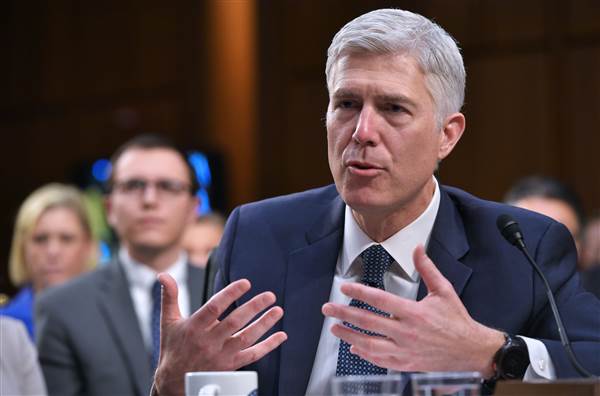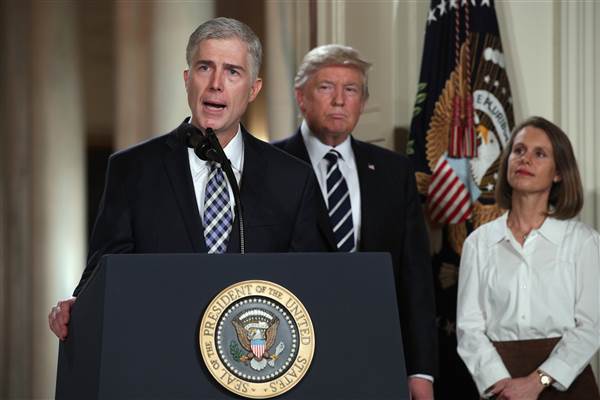NCBCP Headlines
Opinion: Neil Gorsuch’s Frightening Record on Protecting Women’s Rights
Melanie Campbell
NBC News
Mar 30, 2017
Black women in America have always had to cope with the double impact of being black and being a woman. Tradition, culture, custom, laws and even the courts are often stacked against them.
Fortunately, despite all of these obstacles, black women have been able to achieve progress towards equal treatment, equal access and equal opportunity to fully enjoy their rights as defined in the U.S. Constitution.
Related: Cecile Richards: Gorsuch's record on women's issues 'disturbing'
A major factor in these achievements has been the ability to argue their case in our nation's courts. Thanks to many forceful and courageous advocates, and thanks also to fair-minded jurists who believe that the Constitution protects the rights of black women as well as any other American, there has been significant progress with a number of issues of concern to black women.
Now comes President Donald Trump's nomination of Judge Neil Gorsuch to fill the seat of the late Antonin Scalia on the Supreme Court.

Neil Gorsuch testifies before the Senate Judiciary Committee on his nomination to be an associate justice of the US Supreme Court during a hearing in the Hart Senate Office Building in Washington, DC on March 22, 2017.
MANDEL NGAN / AFP - Getty Images
This we know: Throughout his presidential campaign, Donald Trump promised to nominate a Supreme Court justice who would overturn Roe v. Wade, the landmark Supreme Court decision that made a woman's right to make decisions about her own reproductive health - her right to choose abortion - legal.
As a result, for many women, and, in particular for many black women, the possibility of Neil Gorsuch becoming a Supreme Court justice is frightening.
His record on the bench and his testimony at the confirmation hearings bely a judicial mentality that will only spell trouble and is clearly adversarial to the rights of women and their demands for reproductive justice.
Although he refused to discuss his views on Roe v. Wade at the confirmation hearings other than to say "It has been reaffirmed many times," his opinion from the bench have made his position clear. He is against the legal principles on which Roe v. Wade is founded. Among other things, the discussion in his book, "The Future of Assisted Suicide and Euthansia" of death-with-dignity laws and physician-assisted suicide could easily be read as a thinly veiled attack on abortion rights. In it, he wrote, "All human beings are intrinsically valuable, and the intentional taking of human life by private persons is always wrong."
As a judge on the Tenth Circuit Court of Appeals, Judge Gorsuch ruled on numerous cases related to reproductive health rights.
In Planned Parenthood Association of Utah v. Herbert, in a dissenting opinion Gorsuch argued in favor of Utah Gov. Gary Herbert's efforts to defund Planned Parenthood. He also took the unusual step of pushing for a rehearing by the full court, even though the governor did not ask for one.
Gorsuch's opinion at the Tenth Circuit Court in the Hobby Lobby v. Sebelius case laid the groundwork for the Supreme Court's now infamous decision that corporations like Hobby Lobby could withhold federally guaranteed rights to birth control from thousands of female employees because of the religious beliefs of the corporations' owners.
In Little Sisters of the Poor v. Burwell, Gorsuch joined a dissent that argued that the requirement that employers who did not agree with birth control would not have to pay for insurance coverage that would cover birth control should not also be forced them to fill out a form to opt out of the payment. His opinion was that the accommodation of the birth control benefit by filling out the form was a too great a burden on religious exercise.

Judge Neil Gorsuch delivers brief remarks after being nominated by U.S. President Donald Trump to the Supreme Court with his wife Marie Louise Gorshuch during a ceremony in the East Room of the White House January 31, 2017 in Washington, DC. Alex Wong / Getty Images
While reproductive rights and justice are priority issues for women, access to economic justice, employment opportunities that respect a woman's right to have a family, and fair treatment in the criminal justice system are all also very important. Given Judge Gorsuch's record, it is not much of a stretch to assume that he would not be favorable to women when they seek respect for their rights when it comes to the resolution of these issues.
There is not a woman in the United States whose life will not be impacted in some way if Gorsuch would become a member of the Supreme Court. He has clearly staked out positions that are opposed to equal rights for women in a number of issues. The legislative effort to seek confirmation of his appointment in the Senate must be thwarted, or we, the women of America, will undoubtedly suffer.
Melanie Campbell is the President/CEO of the National Coalition on Black Civic Participation and Convener of the Black Women's Roundtable.








